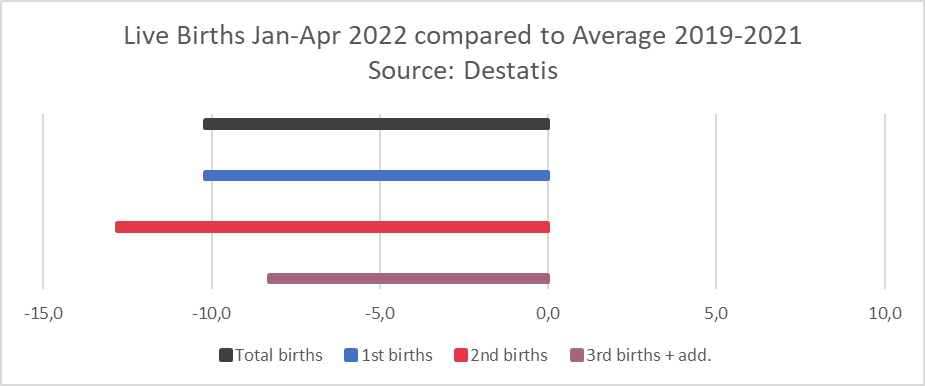Update: Significant drop in German births
April data, first births data, monthly births remain low, my hypothesis fails
My hypothesis seems to have failed.
Update on yesterday’s post with graphs and comments on the new data:
New data for April 2022 has been released - combined births for January to April 2022 are now down ~25,000 from the pre-pandemic average (2017-2020). These “missing births” correspond to a drop of just over 10%. This remains highly unusual and IMHO very troubling. The German Federal Agency for Statistics is somewhat muted in its comments. First let the data speak for itself:
Here is the latest Destatis Press Release:
Significant drop in births from January to April 2022
According to preliminary results, around 222,000 children were born between January and April 2022. Unlike in the comparative period of 2021, the number of births decreased at the beginning of 2022. A similar number of births was last recorded in 2014 (223,240).
The unsettling trend continues, 2022 births are very significantly down. The press release provides a graphic comparing the average for 2019-2021 with months in 2022 but I prefer my graphic below, which shows this year’s figures compared with the average for 2017-2020 and also depicts the individual past five years. Red is 2022, dark blue is the slight bumper-year 2021, Green is the pre-pandemic average (2017-2020).
Destatis’ casual reference to similar births in 2014 is just wild. The data for 2014 was in the normal range for the trend at the time, whereas the data for 2022 represents an abrupt and significant departure from the pre-pandemic normal range. The 2022 drop is unprecedented.
Compared to the average for the years 2019 to 2021, the decline in Germany was 10.8%. In West Germany the number of births fell by 10.0%, in East Germany including Berlin by almost 14.6% (excluding Berlin 14.0%).
As mentioned in my last post, it is important to note the trends from the different demographics, but more significantly, we see births fell across the board by minimum 10%. Next comes the key section for my hypothesis:
So far, the number of births of second children (-12.8%) has fallen at an above-average rate; the decrease was 10.2% for the births of the first children and 8.3% for the third and subsequent children.
How about, “fallen at an above average rate”, for an understatement - they know, but they don’t say! (I misinterpreted here)
Recall the pre-pandemic average for first births was 46.6%. Well, first births have NOT fallen disproportionately compared to the previous year nor with pre-pandemic averages. There is a very slight non-significant slide in the percentage over the 4 months. I have charted the monthly data breakdown provided to me:
Finally, the Statistics Agency notes further demographic differentiations:
The number of births among mothers with German citizenship fell more sharply (-11.6%) than among mothers without German citizenship (-8.4%).
New Summary: The abrupt change in trend and the magnitude of monthly decreases combined with NON-disproportionate decreases to the ratio of first births does NOT seem to support my wedding crasher hypothesis of “missing marriages” to explain the “missing births”.
The steadiness of the trend with approximately 10% less live births every month so far in 2022 is perplexing. How long will this continue?
I really thought I was onto something with the “missing marriages” during the pandemic but without a significant shift in the ratio of first births, the data starts to point back to an issue with miscarriages in Q2-Q4 2022. Recall, although stillbirths were notably up in 2021 measured by the relative change to pre-pandemic levels, the scale of the numbers was very small in comparison to the “missing births”. With regard to conceptions - I don’t think there was early enough uptake in younger cohorts to explain the sudden drop in January.
My new starting point should be to speak again with another midwife or Gynaecologist and try to track down detailed data on miscarriages.








Thank you for this! It has been interesting to read (some of your earlier posts too) and I appreciate your time and effort.
One of my reasons for considering the “vaccine effect” on births is that the drop starts in January 2022, nine months after the vaccine roll-out started. Even if many mothers didn’t get it before becoming pregnant, (March 2021 - say June/July 2021) they might have gotten it while pregnant and had miscarriages. Others might have gotten it before becoming pregnant and are now unable to become pregnant.
Also, I think it would be useful to test your hypothesis with countries that had lockdowns, but not a high rate of vaccinations (e.g. South Africa). Those populations may also have had wedding disruptions, but should have less of a drop in birth rate if the vaccines have an effect on births.
I like the way that you think and reason and I’m glad that you are honest when new data comes out.
I suspect that pre-2016 figures are difficult to compare to post-2016 figures due to the inflow of migrants (mostly younger people).